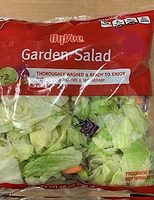On August 12, 2013 Taylor Farms de Mexico officially informed the FDA that, as of August 9, 2013, the company voluntarily suspended production and shipment of any salad mix, leafy green, or salad mix components from its operations in Mexico to the United States. The firm has committed to not resume production and shipping of these products from its operations in Mexico without FDA’s approval. To date only the salad mix has been implicated in the outbreak of cyclosporiasis in Iowa and Nebraska. This voluntary action goes beyond the implicated salad mix and includes iceberg lettuce, romaine lettuce, green leaf lettuce, red cabbage, green cabbage and carrots. The action of Taylor Farms de Mexico exemplifies the company’s cooperation with federal and state officials throughout this ongoing, complicated investigation.
Taylor Farms de Mexico, S. de R.L. de C.V. has been cooperating with all FDA requests during the investigation. The Mexican government’s food regulatory authorities, the Federal Commission for Protection against Sanitary Risks (COFEPRIS) and the National Agro-Alimentary Health, Safety and Quality Service (SENASICA), have also been collaborating with FDA in the investigation of this outbreak.
The FDA and the firm will conduct an environmental assessment of the firms processing facility in Mexico, to try to learn the probable cause of the outbreak and identify preventive controls to put in place to try and prevent a recurrence. The most recent inspection, in 2011, of the processing facility of Taylor Farms de Mexico, S. de R.L. de C.V. conducted by FDA found no notable issues. Additionally, as a result of this investigation FDA is increasing its surveillance efforts on green leafy products exported to the U.S. from Mexico.
The Iowa Department of Inspections and Appeals (DIA) and the Nebraska Department of Health and Human Services have announced that they believe the contaminated salad is no longer in the food supply in those states. The last date that someone reportedly became ill with cycloporiasis in Iowa was on July 1, and in Nebraska on July 2. The typical shelf life for a salad mix is up to 14 days.
FDA will continue to work with its federal, state and local partners in the investigation. The goal will be to combine information collected from other affected states with that provided by the state health authorities in Iowa and Nebraska to identify a specific food item linked to the illnesses. Should a specific food item be identified, the FDA, CDC, state and local partners will work to track it to its source, determine why the outbreak occurred, and if contamination is still a risk, implement preventive action, which will help to keep an outbreak like this from happening again.
FDA is following the strongest leads provided by the states and has prioritized the ingredients of the salad mix identified by Iowa and Nebraska for the traceback investigation, but is following other leads as well. In the traceback process, the traceback team identifies clusters of people made ill in separate geographic areas and works to trace the path of food eaten by those made ill to a common source. This is labor intensive and painstaking work, requiring the collection, review and analysis of hundreds and at times thousands of invoices and shipping documents.
FDA has dedicated a 21-person team at the headquarters level to solving this outbreak, and will augment this team as needed. Additionally, there are FDA specialists across the country in 10 field offices working on the outbreak.
In an effort to leverage all sources of information that could be available on this outbreak, FDA has asked its field offices to review and send information forward from consumer complaints that could be Cyclospora related. FDA will evaluate these consumer complaints to determine whether they provide information to supplement the epidemiology provided by the CDC and the states. FDA will also evaluate this information to determine if there might be opportunities to collect product samples.


